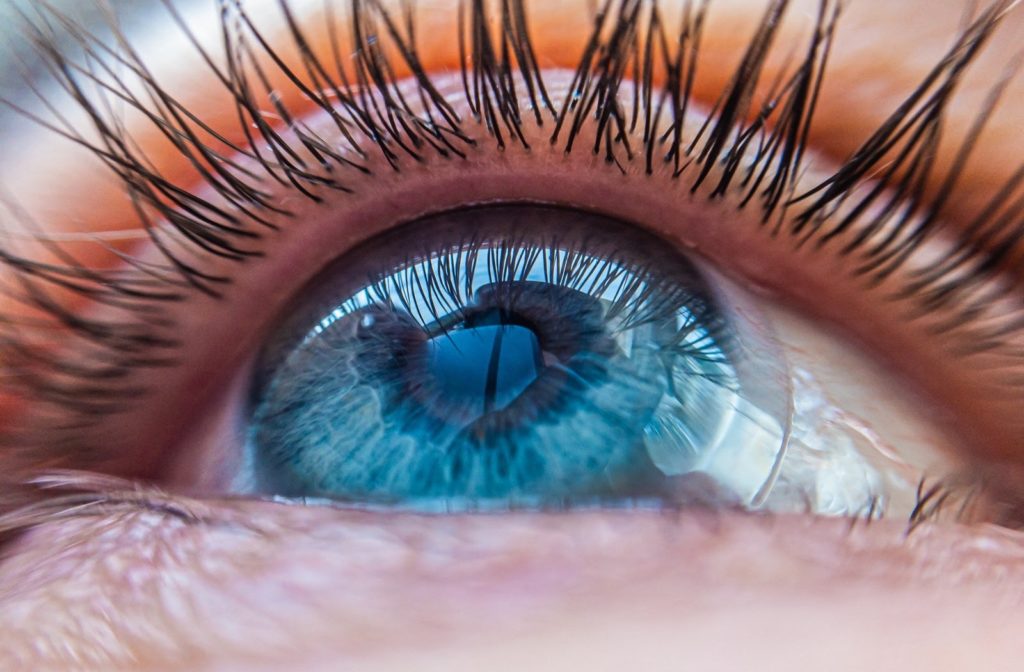Changing up your look from glasses to contact lenses is always a great option to have. Contact lenses are an excellent alternative, and your optometrist can conduct a thorough contact lens exam to determine your prescription.
Contact lenses do come with some questions and concerns—let’s take a closer look at the types of contact lenses and if they can ever get lost in your eye.
Types of Contact Lenses
Reducing your reliance on glasses or just wanting to change your look is common. Contact lens technology has come a long way, and you have more options than ever.
Soft Contact Lenses
Soft contact lenses are made of malleable plastic polymers that can be formed to the cornea when they fit properly. Soft contacts are also the most commonly worn type of contact lens. They are used to correct various vision problems such as:
- Nearsightedness (myopia)
- Farsightedness (hyperopia)
- Blurred vision (astigmatism)
- Age-related loss of close-up vision (presbyopia)
Soft contact lenses also come in daily wear lenses and overnight extended wear lenses.
Rigid Gas Permeable (RGP) Lenses
Rigid gas permeable lenses are more durable than soft contact lenses and provide an easier care system as well. Modern RGP lenses allow more oxygen to pass through to the eye so that your eyes can breathe and be more comfortable.
It can take a few weeks to adjust to RGP lenses, and if your prescription doesn’t change with proper maintenance, you can use the same pair for 2 to 3 years.
Scleral Contact Lenses
Scleral contacts are large-diameter gas-permeable contact lenses designed to cover the entire corneal surface and rest of the sclera. Scleral contacts can morph an irregular cornea into a smooth optical surface.
Scleral contacts are gas-permeable, allowing oxygen to reach the eye’s surface, resulting in more breathability for your eye. This breathability can help people who are dealing with dry eye disease and still want to wear contact lenses.
These are some of the common options for contact lenses, but sometimes your optometrist may recommend specialty contact lenses depending on your prescription and the unique needs of your eyes.
Aspheric Lenses
Aspheric contact lenses are specifically designed for people dealing with mild astigmatism. These specially shaped lenses are needed to compensate for the unique curvature caused by astigmatism.
Aspheric lenses are an excellent way for people with mild astigmatism to achieve clearer vision.
Toric Lenses
Toric contact lenses are shaped in a particular way to give them the ability to counteract the effects of astigmatism. These lenses have different prescriptions along the horizontals and verticals of the lens.
Toric lenses are also weighted at the bottom to adjust themselves properly as you blink, ensuring that the prescription of the lens match that of your eye.
Multifocal Lenses
Multifocal contact lenses work similarly to multifocal eyeglasses. They are designed to help those with presbyopia, also known as age-related loss of close-up vision. Multifocal lenses contain multiple prescriptions in a single lens and aim to deliver consistent, clear vision at all distances.
Multifocal contact lenses also work for those who are nearsighted or farsighted.
MiSight for Myopia Control
MiSight contact lenses utilize a unique technique called myopic defocusing to manage the effects of myopia, also known as nearsightedness.
Myopic defocusing focuses peripheral light in front of your child’s retina that signals your eyes to slow down myopia progression.
Now that you know some of your options for contact lenses let’s look at a common fear of if contact lenses can get lost in your eye.
Contact Lens Safety
Contact lenses offer a diverse variety, and there are solutions for all sorts of vision issues, but there are some concerns. One of the major concerns is if contact lenses can get lost in your eye.
Usually, the concern stems from if your contact lens can become dislodged and get trapped behind your eye.
The answer is no—your contact lens cannot be lost in your eye.
The inner surface of your eyelids contains a thin, moist lining known as the conjunctiva. The conjunctiva folds back and becomes the outer covering of the white part of your eyeball. This continuous process makes it impossible for a contact lens to get lost or stuck behind your eye.
You may feel like your contact lens is stuck, but in reality, you may end up scratching your cornea trying too hard to get it out. It’s essential that you contact your optometrist as soon as possible if you feel your contact lens is stuck.
Your optometrist can examine your eye, determine if you’ve scratched your cornea, and provide some tips to avoid any incidents in the future.

Feeling Comfortable with Contact Lenses
Comfort with your contact lenses can take some time to develop, especially if you’re switching from glasses. Finding the right prescription is essential, and running any questions or concerns by your optometrist can prevent some stress down the line.
Book an appointment with your optometrist today for more information on contact lenses, and get your own pair.


